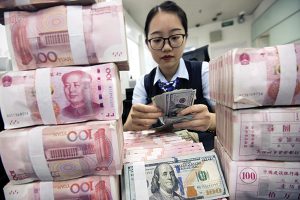Bloomberg
China sought to maintain ample cash levels in its financial system with liquidity tools of different maturities, helping halt the worst government bond selloff in six years.
The liquidity infusion this month, which was done with a combination of short, medium and long-term tools, exceeded the 1 trillion yuan maturity, according to the People’s Bank of China (PBOC). That coupled with the release of worse-than-expected economic data helped cap the spike in the benchmark bond yield.
The moves signal a shift in market sentiment from November 14, when government bonds posted their biggest selloff since late 2016 following fresh property support measures and tweaks to China’s Covid policy.
Hopes for a quick relaxation of virus controls were dampened by the flagship newspaper of the Communist Party, which reiterated Beijing’s pledge to stick with Covid Zero. Fresh evidence of a slowdown in economic activities also boosted the demand for haven assets like sovereign debt.
“It appears to be a largely liquidity neutral operation,†referring to the PBOC’s statement on liquidity tools, said Winson Phoon, head of fixed income research at Maybank Kim Eng Securities. “It probably serves as an interim liquidity bridge and the overall composition has been gradually shifting towards more medium-term targeted funding.â€
The PBOC injected 850 billion yuan ($120 billion) via its medium-term lending facility, it said in the statement, at a steady rate of 2.75%. On top of that, it also pumped in 320 billion yuan of medium-to-long-term liquidity by via Pledged Supplemental Lending and re-lending to the tech sector this month. It added another 170 billion yuan of seven-day funding.
The operation “fully met the demand of financial institutions,†the PBOC said, adding that total injections in November were higher than MLF maturities. It had vowed to maintain a “reasonable†growth of money supply and credit last week.
The yield on 10-year government bond slid two basis points to 2.82% as of 11:10 am local time. On November 14, the yield spiked to as high as 2.84%, according to Bloomberg compiled data. That helped to trigger a selloff in three- and five-year onshore corporate bonds, the yields on which surged the most since at least 2016.
China Bankers Face Deeper Pay Cuts
Senior executives across China’s $58 trillion financial system are facing additional pay cuts as firms from investment banks to mutual funds weigh options to comply with President Xi Jinping’s “common prosperity†drive.
At least four of the biggest state-controlled securities firms and asset managers are drafting plans to narrow the compensation gap between senior and junior staff, according to people familiar with the matter, who asked not to be identified as the information is private. Some may submit proposals to regulators in the next few months, the people said.
Capping total pay and deferring incentive bonuses for longer periods are among options being considered, the people said. In Hong Kong, at least two China-backed investment banks are deliberating how to level pay among different ranks but also between their onshore and offshore units, the people added.
Compensation levels in Hong Kong have traditionally been significantly higher than in mainland China.
The moves come on the heels of China’s Party Congress, where Xi stressed his “common prosperity†campaign while further consolidating power. Xi’s pledge to create a “well regulated†system of wealth accumulation has fueled intense speculation over how policy makers might achieve that goal, contributing to a deep selloff in Chinese assets last month.
Markets have since rebounded after Xi recalibrated his Covid Zero policies to lessen their economic impact, moved to stabilise China’s fraught relationship with the US and rolled out a sweeping package of support measures for the beleaguered property sector. With financial-sector pay representing a small slice of the overall common prosperity push, the government’s broader plans for that campaign remain unclear.
 The Gulf Time Newspaper One of the finest business newspapers in the UAE brought to you by our professional writers and editors.
The Gulf Time Newspaper One of the finest business newspapers in the UAE brought to you by our professional writers and editors.
